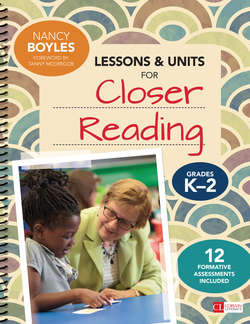Читать книгу Lessons and Units for Closer Reading, Grades K-2 - Nancy Boyles - Страница 46
На сайте Литреса книга снята с продажи.
How to Evaluate Students’ Written Responses
ОглавлениеOne of the criteria to which students are typically accountable in their written responses is organization. In this case, however, the Reader Response Frame organizes their answer for them so this will not be a factor. For the assessments in this book, I suggest that you consider four criteria, though you will need to decide to what degree each one is appropriate based on the developmental level of your students. Look for the following:
Accuracy. Above all, the response must be correct based on the content of the text. In most cases there will be one clearly correct response. (What is the text feature? Does the detail support the central idea?) But sometimes more than one answer might be plausible. In such cases, look carefully at the way the student has explained his or her choice before considering a particular answer accurate or inaccurate.
Elaboration. Remember that all responses will need to be well supported with evidence from the text. This is something that will be important right from the start, even in kindergarten. Look for textual details that are spot-on, showing a clear alignment between the answer and the evidence for the answer.
Fluency. This is the criteria that will vary the most in the primary grades. If you decide to evaluate student work based on this criteria, you will want to check that the answer makes sense when read aloud. Aim for complete sentences rather than single words or phrases. Aim for language that relies on key words from the text but is not copied word for word. Aim for spelling and punctuation that doesn’t get in the way of understanding.
Insight. This criteria may not play a significant role when students’ responses are evaluated on high-stakes assessments, but if you want your students to be reflective learners and if you want to maximize the potential of formative assessments for driving instruction, this is a powerful criteria to consider. Can students explain their thinking? Can they tell you how they know and why something might be important?
The following rubric may need to be adjusted for some responses, but generally these guidelines should help you determine valid scores on the Reader Response Frames. For formative assessment I am less concerned with the composite score and pay greater attention to each of the four individual criteria described above. Note that additional, more specific criteria for accuracy, elaboration, and insights are specified for individual skill assessments under the heading Tips for Evaluating Students’ Responses.
